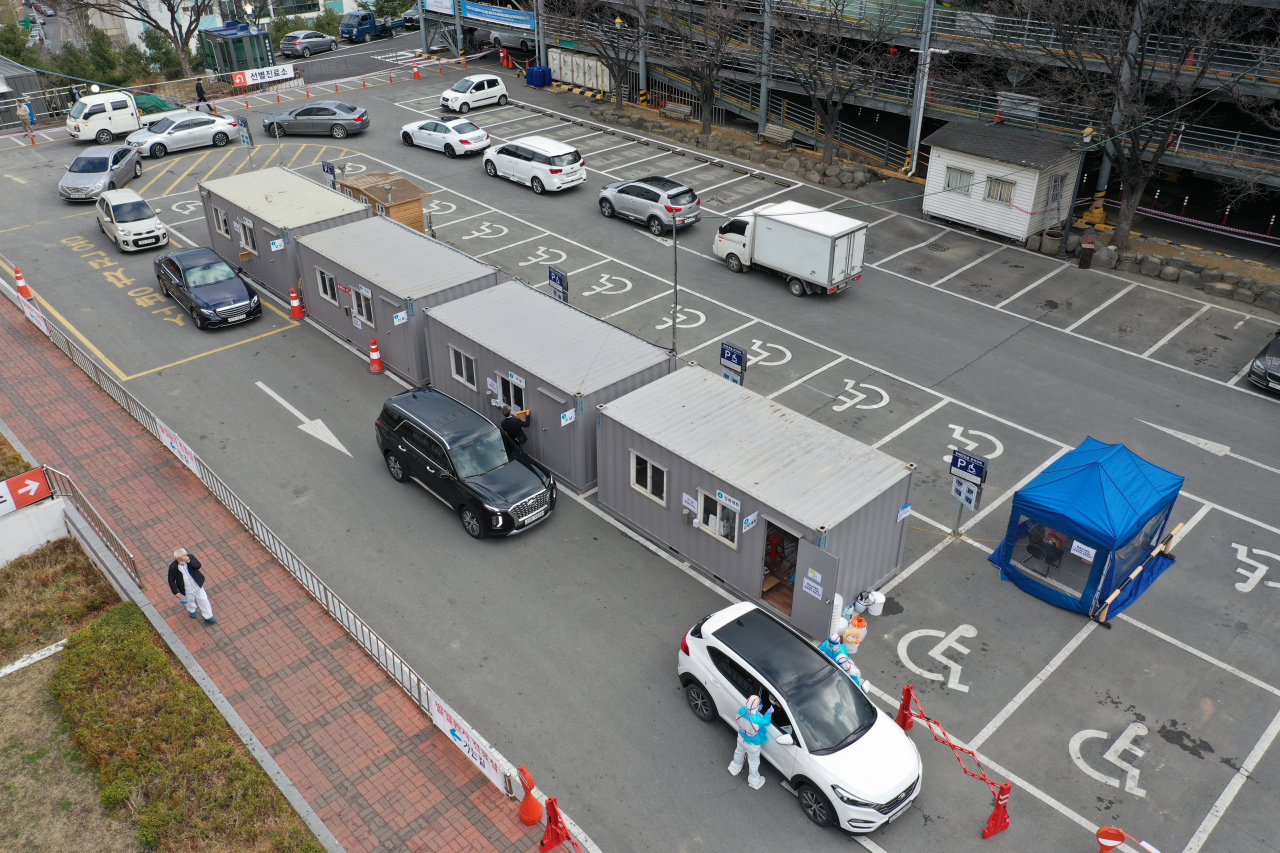Drive-thru clinics, drones: Korea’s new weapons in virus fight
Experts say at-home testing kits risky, lack accuracy
By Kim ArinPublished : Feb. 27, 2020 - 18:17

South Korea is trying new ploys to battle the novel coronavirus outbreak, with two of the latest being drive-thru clinics and disinfecting drones.
Goyang, Gyeonggi Province, set up a drive-thru testing facility on Wednesday, where symptom checks, sample collection and payment receipt are done in one-stop fashion in under 10 minutes.
Gyeonggi Province communications official Park Hyun-su told The Korea Herald that the checkups at the drive-thru are about 20 minutes faster than the typical way done at hospitals or public health centers. About 100 people a day visit the temporary clinic in Goyang, which is set to run every day between 10 a.m. and 5 p.m. until March 11.
Park said the service will soon be introduced in other regions of the province, with the next expected to be installed in Bucheon. Other cities outside Gyeonggi Province with drive-thru clinics are Daegu and Sejong.
Goyang native Lee Ki-jung, 31, said the drive-thru clinic felt less daunting than visiting state-designated health institutions.
“It’s good knowing that I can make a quick stop if I started having symptoms,” he said. “Plus, it would lessen my chance of running into a virus patient and becoming infected or having to be isolated.”
Demand for COVID-19 tests is high, as its early symptoms are known to be indistinguishable from those of flu or the common cold.
Inquiries from confused patients spiked after the government announced on Monday that three- to four-day self-quarantine is recommended for all those having respiratory symptoms or fever, a nurse at an internal medicine clinic said.
She said the drive-thru clinics would spare patients from risky visits to doctor’s offices where they may come into contact with infectious persons.
Disease control officials at district offices across the country are also employing drones to disinfect high-risk spots.
An army of drones flew over a hospital in Cheongdo, North Gyeongsang Province, on Thursday afternoon, where at least seven deaths and 114 confirmed cases have been reported.
Amid the surge in suspected patients waiting to be tested, companies are rushing to develop diagnostic kits that can be done at home.
One such company is PCL, which announced Wednesday to cheers from the public that it had succeeded in developing an at-home COVID-19 test kit. The kit would be faster than the current molecular diagnosis used at medical institutions that are state-accredited to treat the virus, the company said.
In a phone interview, the Drug Safety Ministry said the alleged success in developing an at-home rapid test kit for the virus was “what the company claims,” and that its viability was “not at all confirmed.”
Sung Heung-sup, a laboratory medicine specialist at Asan Medical Center in Seoul, said that because the rapid antigen test lacked greatly in specificity and sensitivity, its use was not advisable when coping with a highly infectious disease like COVID-19.
“Prompt detection followed by isolation is the only way to mitigate the spread of an infectious disease for which there exists no vaccines or treatment,” he said, adding that the kits risked false-negative patients going on with their daily routine believing they are not infected and transmitting the disease.
Lee Hyuk-min, director of the Korean Society for Laboratory Medicine, said that the rapid kit is based on an immunoassay technique, which is used neither by the World Health Organization nor the US Centers for Disease Control and Prevention to test for COVID-19.
“There’s a growing number of companies claiming to have developed diagnostic tools for the virus, without due verification,” he said.
Jang Cheol-hoon, director of the Korean Society of Clinical Microbiology, also expressed skepticism over the test kits, which he said used “a much older, less accurate method” than ones used now by specialists.
PCL did not respond to The Korea Herald’s calls and an email requesting comment.
By Kim Arin (arin@heraldcorp.com)



















![[Today’s K-pop] Treasure to publish magazine for debut anniversary](http://res.heraldm.com/phpwas/restmb_idxmake.php?idx=642&simg=/content/image/2024/07/26/20240726050551_0.jpg&u=)